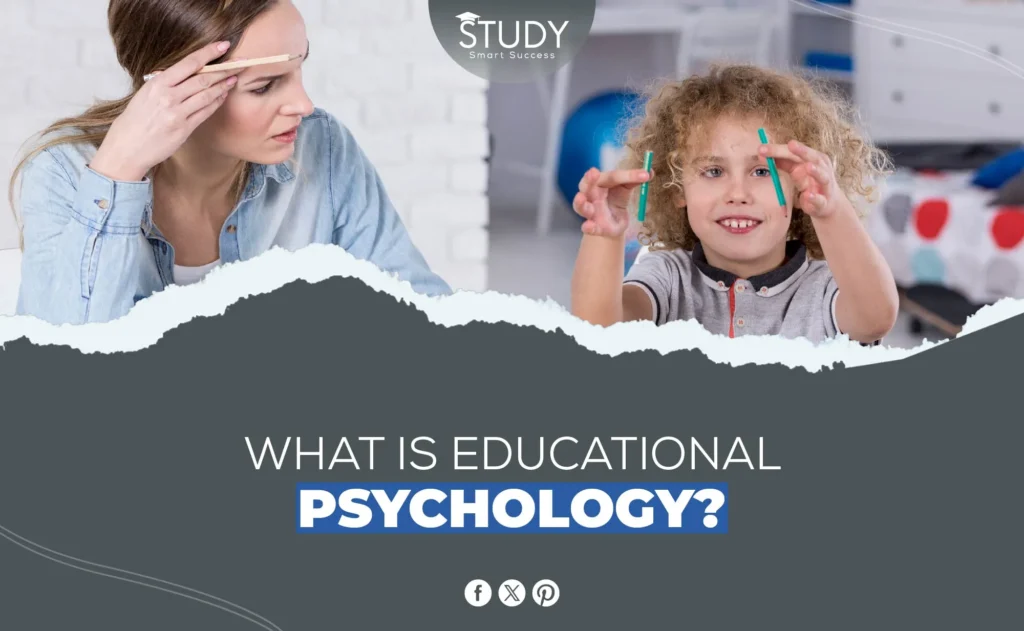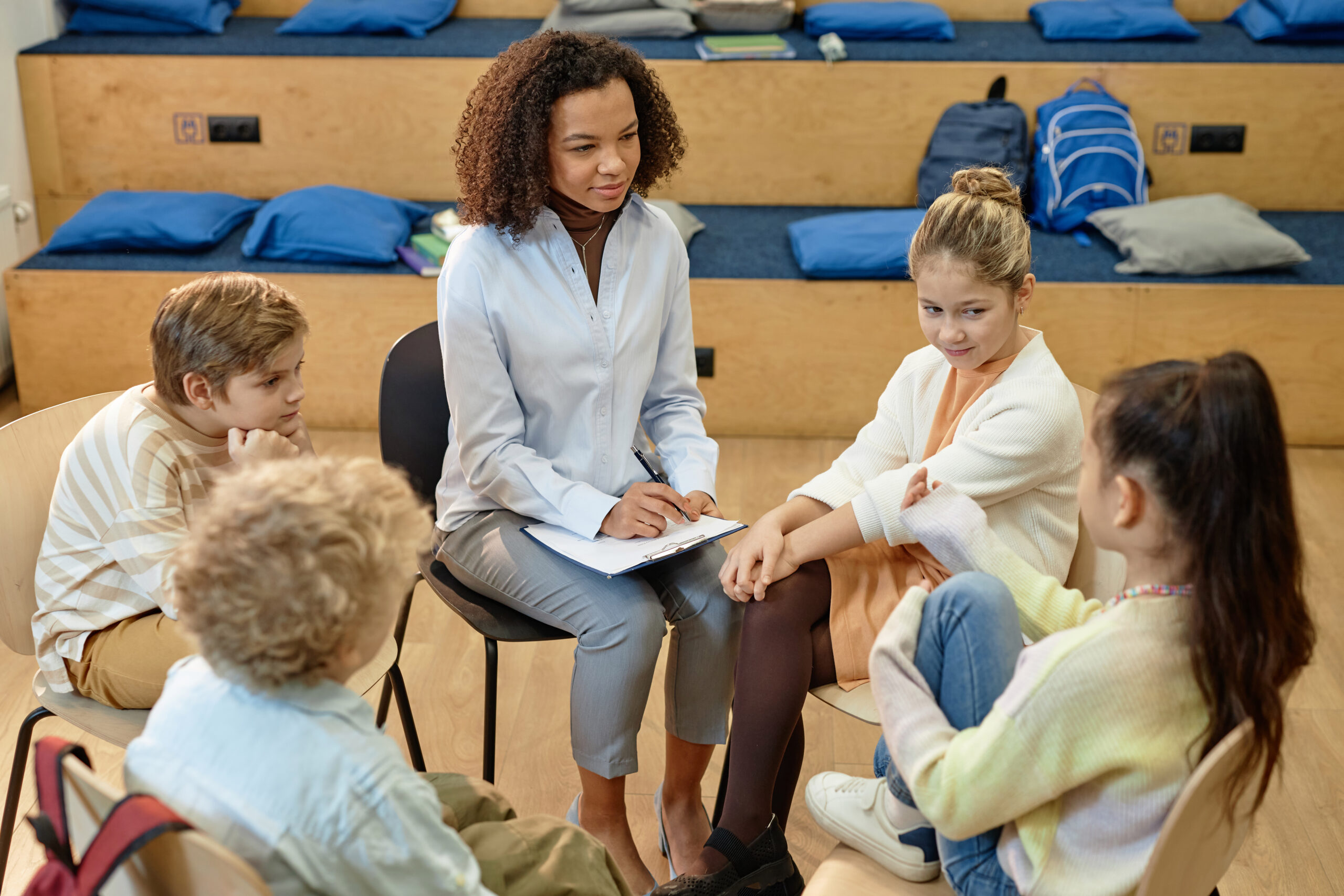Educational psychology, an essential part of good teaching, examines how people learn and grow in school situations. It shows how cognitive, social, and emotional factors affect learning results, from how it was first thought to how it is used today. By combining theory and practice, teachers create settings where everyone feels welcome and help students do their best. Read further about the Psychology Education Requirements.
Introduction
Educational psychology combines psychological ideas with how schools work to help teachers and students do their jobs better. This guide will get right to the heart of educational psychology, explaining what it is and how it shapes the learning process.
Definition of Educational Psychology
Educational psychology is the field of study that examines how people learn and grow in school. It explores how cognitive, emotional, and social factors affect how well people learn in many different ways. Educational psychology tries to improve teaching methods and student success by combining psychological ideas with academic practices.
Importance of Educational Psychology in Learning
Educational psychology helps educators understand the learning process and the elements that support or inhibit academic success. Educators may tailor lessons to students’ needs and preferences by understanding learning psychology.
Educational psychology also helps educators build inclusive learning settings that encourage intellectual curiosity, intrinsic drive, and social-emotional well-being. Integrating educational psychology ideas helps educators unlock students’ full potential for lifelong learning and academic success.
Historical Overview of Educational Psychology
Origins of Educational Psychology
Educational psychology emerged in the late 19th century as scientific approaches to human behavior and cognition gained popularity. Scholars studied psychology and pedagogy as schools struggled with various student demographics and learning skills.
Wilhelm Wundt and William James promoted educational psychology by emphasizing experimental methodologies and individual learning characteristics.
Key Figures and Their Contributions to Educational Psychology
Several influential personalities have shaped educational psychology’s theoretical foundation and practical applications. Jean Piaget, a cognitive development pioneer, changed our understanding of how children learn by exploring and interacting with their surroundings.
With his sociocultural theory, Lev Vygotsky stressed the importance of peer collaboration and scaffolding in learning and the function of social interactions and cultural context in cognitive development.
Evolution of Educational Psychology
Educational psychology has changed dramatically to meet shifting educational philosophies and societal requirements. The area has included new theoretical viewpoints and empirical findings since the behaviorist principles of stimulus-response conditioning to the cognitive revolution of mental processes and information processing models.
Educational psychology uses constructivism, social cognition theory, and socioemotional learning frameworks due to its dynamic character and continual pursuit of academic excellence for varied learners.
Core Concepts of Educational Psychology
Learning Theories in Educational Psychology
Behaviorism
Behaviorism, developed by B.F. Skinner holds that environmental stimuli and behavior influence learning. Behaviorists believe people learn new skills through reinforcement and punishment.
Constructivism
Jean Piaget promoted constructivism, which holds that learning is an active process of building knowledge from earlier experiences and environmental interactions. Learners scaffold new information onto cognitive structures and actively make meaning.
Social Cognitive Theory
Social cognitive theory, developed by Albert Bandura, emphasizes the interplay between cognition, behavior, and society. Learning outcomes depend on observational learning, self-efficacy, and modeling.
Cognitive Constructivism
Lev Vygotsky’s cognitive constructivism emphasizes social interactions and cultural tools in cognitive development. The zone of proximal development (ZPD) emphasizes collaborative learning and guided instruction for mental progress.
Developmental Psychology
Piaget’s Theory of Cognitive Development
Piaget’s theory divides cognitive development into sensorimotor and formal operational phases, each with cognitive capacities and worldview. Piaget stressed absorption, accommodation, and equilibrium in mental development.
Vygotsky’s Sociocultural Theory
In cognitive development, Vygotsky’s sociocultural theory emphasizes language, culture, and social interactions. The zone of proximal development (ZPD) emphasizes collaborative learning and scaffolding for cognitive development.
Erikson’s Stages of Psychosocial Development
Erikson’s psychosocial theory has eight stages, each with a unique developmental goal or crisis. Erikson’s theory emphasizes social relationships and identity formation from trust vs. mistrust in infancy to integrity vs. despair in old life.
Motivation and Learning in Educational Psychology
Intrinsic vs. Extrinsic Motivation
Extrinsic motivation comes from incentives and punishments, while intrinsic motivation comes from internal drives and interests. Intrinsic drive enhances learning and retention.
Goal Setting and Achievement
Setting goals gives students direction and purpose, motivating them to succeed. Goal-setting systems like SMART improve academic performance and self-regulation.
Self-Efficacy
Self-efficacy is a person’s confidence in their capacity to do tasks. Self-efficacy increases effort, persistence, and resilience in facing challenges, improving learning results.
Applications of Educational Psychology
Classroom Management in Educational Psychology
Creating a Positive Learning Environment
A positive classroom environment gives pupils a sense of belonging, safety, and respect. Setting clear expectations, creating healthy teacher-student connections, and encouraging collaborative learning create a good learning environment.
Behavior Management Techniques
Effective classroom behavior management promotes desired behaviors and addresses challenging behaviors. Positive reinforcement, behavior contracts, and proactive classroom management plans assist in maintaining order and interest in learning.
Assessment and Evaluation
Formative vs. Summative Assessment
Formative assessments are informal, ongoing assessments that measure student growth and enhance instruction. Summative assessment evaluates student learning after a unit or course. Balanced formative and summative evaluations aid instructors in student learning and teaching.
Standardized Testing and Alternatives
Standardized testing is widely used to evaluate student performance. However, it only captures some student’s abilities and capabilities.
Educators use performance evaluations, portfolios, and project-based exams to assess student learning better.
Special Education
Inclusive Education Practices
Inclusive education accommodates all pupils, including those with impairments or special needs. Universal learning design (UDL) and inclusive classroom communities guarantee equal learning opportunities for all students.
Individualized Education Plans (IEPs)
IEPs for disabled students include academic, behavioral, and social-emotional goals and the support services and accommodations needed to achieve them.
Teacher, parent, and specialist collaboration ensures effective intervention strategies are personalized to each student.
Contemporary Issues and Trends in Educational Psychology
Technology Integration in Education
Teachers and students face opportunities and challenges when technology is used in education. Digital tools and resources improve learning, collaboration, and personalization. Technology allows investigation and participation, from interactive multimedia presentations to online learning platforms.
However, digital fairness, screen time, and balancing technology use and conventional teaching methods highlight the need for intentional integration and digital literacy instruction.
Cultural Diversity and Inclusion
Diversity of cultures adds new insights, experiences, and ideals to education. Cultural diversity and inclusion in education include valuing students’ cultures, promoting multiculturalism, and implementing inclusive curricula and classroom procedures.
Culturally responsive teaching methods like including varied perspectives in the curriculum and encouraging cross-cultural conversation help pupils appreciate their cultural heritage and human diversity.
Mental Health and Well-being of Students
Student mental health and well-being are increasingly crucial to academic success and development. Creating supportive, trauma-informed schools prioritizing emotional wellness and providing mental health resources helps solve school mental health challenges.
Teachers teach students mental health literacy, DE stigmatization, resilience, and coping strategies. Collaboration with school counselors, mental health professionals, and community organizations provides complete student mental health support.
Conclusion of the Article What is Educational Psychology
Educational psychology is the foundation of effective teaching and learning. It helps educators understand the learning process and improve student outcomes. Educational psychology illuminates how cognitive, social, and emotional aspects affect learning and development from its origins to the present.
By understanding learning theories, developmental psychology, and motivation, instructors can adapt their lessons to students’ different requirements and learning styles. Classroom management, assessment, and inclusive education help instructors establish supportive learning environments that promote academic success and holistic development.
Technology integration, cultural diversity, and mental health must be addressed as education evolves. Innovative techniques, cultural competence, and student well-being are crucial to inclusive, equitable, and empowered learning environments.
Educational psychology guides educators to maximize student potential and develop the next generation of critical thinkers, problem solvers, and lifelong learners. We can improve education and make it more inclusive by adopting educational psychology.



